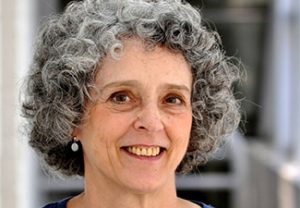
- This event has passed.
2021 Jerome S. Simon Lectures (Holly M. Smith, Rutgers University)
Wednesday March 17, 2021, 3:00 pm - Friday March 19, 2021, 5:00 pm
Event Navigation

We are pleased to announce Holly M. Smith as our esteemed speaker for the 2021 Jerome S. Simon Lectures. Dr. Smith is Distinguished Professor Emerita of Philosophy at Rutgers University. She has also held appointments at Tufts University, the University of Pittsburgh, the University of Michigan, the University of Illinois-Chicago, and the University of Arizona. Dr. Smith has published widely on topics in normative ethics, moral decision making, the theory of moral responsibility, and bio-medical ethics. In Making Morality Work (OUP, 2018), she explores how moral theories should accommodate the errors, ignorance, and misunderstandings that impede us as moral decision makers. Her current projects propose new strategies for weighing the stringency of deontological duties, and for identifying an agent’s alternatives in the context of normative theories.
Dr. Smith will be giving three lectures, on March 17, March 18, and March 19, respectively, from 3 PM to 5PM.
Join the lectures (same link for all three):
https://utoronto.zoom.us/j/88293034899
Meeting ID: 882 9303 4899
Passcode: 489306
Lecture 1 Title
Even More Supererogatory I
Lecture 1 Abstract
In order to provide enough healthcare workers during the initial explosive outbreak of COVID-19 in New York City, the mayor pleaded with medical students and retired physicians and nurses to join the medical staff dealing with the flood of desperately ill patients. A small army of volunteers responded. Given the difficulty and danger of this work, and the fact that these individuals had no duty to volunteer, these were heroic acts of supererogation. But since the elderly retired physicians and nurses were known to be more vulnerable to infection and death from the virus than the young medical students, it’s plausible to say that the acts of the retired medical personnel were even more supererogatory than those of the medical students. But what makes an act supererogatory, and one supererogatory act more supererogatory—morally better—than another? This lecture aims to answer these questions by first providing an account of what features make an act supererogatory, and then an account of what makes one supererogatory act better than another.
Lecture 2 Title
Even More Supererogatory II
Lecture 2 Abstract
This lecture continues the investigation launched in the first lecture, broadening the scope of acts to be assessed for their comparative supererogatoriness. It will also compare the approach I advocate with an alternative account outlined in their seminal paper, “More Supererogatory,” by Toronto’s Thomas Hurka and Evangeline Tsagarakis. I argue that despite the attractions of Hurka and Tsagarakis’s approach, it is less satisfactory than the one I have outlined.
Lecture 3 Title
Suberogatory and Even More Suberogatory
Lecture 3 Abstract
Some theorists hold that there are “suberogatory” acts—acts characterized as bad but nonetheless permissible. Other theorists deny there are any such acts. In this lecture I propose an account of what suberogatory acts are that makes it clear such acts do (or at least can) occur. However, I reject the claim that all suberogatory acts are full-on bad. I then use my account of what makes an act suberogatory to provide an account of when one suberogatory act is more suberogatory—morally worse—than another. I explore the relationship between supererogatory and suberogatory acts, and end by arguing that my account of the suberogatory solves one of the paradoxes of supererogation.
About the Simon Lectures
One of the department’s several endowed lecture series, the Jerome S. Simon Lectures are a biennial series of colloquia given by a philosopher of international distinction. After a brief hiatus, we are thrilled to reinvigorate the series in 2021. Past Simon lecturers have included David Velleman (Michigan), David Wiggins (Oxford University), Anil Gupta (Pittsburgh), Barbara Herman (UCLA), John Campbell (UC-Berkeley), Donald Rutherford (UC-San Diego), Jennifer Hornsby (Birkbeck, London), and Samuel Scheffler (NYU).
SHARE